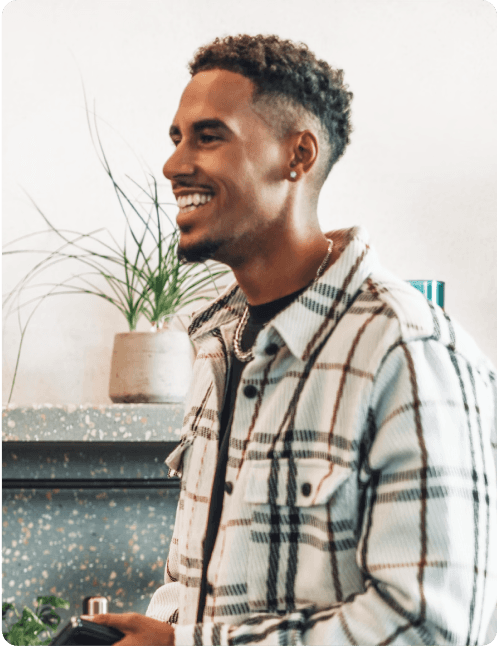Nov 13, 2020
Nov 13, 2020
Nov 13, 2020
10 Ideas to Improve Your Interviewing Skills and Assessment Style
10 Ideas to Improve Your Interviewing Skills and Assessment Style
10 Ideas to Improve Your Interviewing Skills and Assessment Style


The Bryq Team
HR Experts
Bryq is composed of a diverse team of HR experts, including I-O psychologists, data scientists, and seasoned HR professionals, all united by a shared passion for soft skills.
Bryq is composed of a diverse team of HR experts, including I-O psychologists, data scientists, and seasoned HR professionals, all united by a shared passion for soft skills.




While being great at interviews as a candidate takes a lot of skill, being a great interviewer requires even more skill. Remember that the candidate is sizing you up just as much as you are assessing them, so you need to be prepared, professional, and calm. Find out our top to 10 ideas for improving your interview skills and assessment style so that you can find the best possible candidates.
Communicate with the Panel
If you’re interviewing as part of a panel, make sure that you all meet up before the interviews. This will give you the chance to confirm the interview questions and who will ask what. You don’t necessarily need a lead interviewer, but at least agree who will greet the candidate and do the introductory element of the interview. By communicating about this with the rest of the panel beforehand, you can save yourselves from speaking over each other during the interview.
Re-read the Application
To improve your interviewing skills, re-read the application before the candidate arrives, so that it’s fresh in your mind. Then you can ask questions that show you know who they are and dig deeper into areas of their experience you aren’t sure about. For example, upon re-reading their CV, you may realize that there is an unexplained career gap. Then you can ask them more about this in the interview to discover the reason why.
Know What You’re Looking For
Successful interviewing relies on you knowing what type of person you’re looking for. When you go into an interview knowing what skills and abilities you’re looking for in a candidate, this will make you a better interviewer. You will be able to ask questions related to what you’re looking for and it will help you get a great outcome from the interview process. Take a look at the job description and note down any important traits you are seeking.
Be on Time
‘Be on time’ is typical interview advice for candidates, but it’s important for you to be on time as well. Being late shows a lack of respect for the candidate’s time. What if they are your ideal candidate but they don’t feel respected and turn down the role? You don’t want that to happen, so show respect for them and improve your interviewing skills by being on time for the interview.
It’s recommended that you leave a window of time between back-to-back interviews in case the first one runs over. This should give you the chance to be on time for every single interview you run.
Build Rapport
Interviews shouldn’t be scary. By building the rapport with candidates, you can help them to feel at ease and open up more during the interview. This will help you to get better information from them. Allow time at the beginning of the interview for some small talk. Then you can start by setting the scene. This will include talking a bit about the company and letting them know what type of questions will be asked. Tell them that they can ask you for clarification if any interview questions are unclear.
If you are taking notes during the interview, mention this and explain why you need to do it. Some people can find it off-putting, and will wonder what you are writing down about them. Addressing it at the start of the interview can relax the nerves associated with this.
Active Listening
Active listening is one of the most crucial interviewing skills you need to have. It can be a great way of ensuring that you have understood the point the interviewee was trying to make. By repeating back to them their main point or emotion associated with an example, you can confirm that you have interpreted what they said correctly. This is important for how you view the person and ensuring that you are both communicating clearly.
Body Language
Cold, stand-offish interviewers can have a harder time getting candidates to open up. If a candidate is closed off, it can be tough to determine whether they would be a good fit for your company. To make the most of the job interview, you can help the candidate warm up to you by displaying positive body language. Body language can also show that you are listening, which is a trait required from an effective interviewer. For example, lean forward when they are talking, make eye contact, and nod your head when they make a point.
Guide the Conversation
Part of your job as an interviewer is not just to ask questions but guide the responses. We have all conducted an interview where the interviewee has gone off on a tangent or not directly answered the question. Don’t just leave it – prompt them to get back on track or answer the specific question. This will help you to get the information you need out of the candidate, so don’t be afraid to steer the conversation in a certain direction.
Don’t Be Afraid of Silence
Silence during the interview process is not something to be afraid of. There’s nothing worse than when you’re trying to formulate a response to something, and the other person just keeps on talking. If the candidate is silent after you ask a question, stay quiet and let them think. They will likely be considering the best way to respond to your question, and they need space to do this.
You never know what you will learn by staying silent. If you are quiet even briefly after they have answered a question, you will discover that the person will often add more information. This is information you would otherwise have not found out if you’d just kept talking. So, silence can lead to valuable information – don’t underestimate the power of this!
Follow Up
At the end of the interview, let the candidate know when they can expect to hear back from you. Thank them for their time and walk them out. It is these small gestures that can go a long way towards the interviewee’s impression of you.
Then, make sure that you actually follow up with them by the time you said you would. Even if you haven’t reached a decision by that date, just touch base to let them know that the decision is taking longer than expected. They will appreciate not being left waiting.
Use these 10 tips to improve your interviewing skills and get the most value out of interviews that you can. By knowing what you want, making the candidate feel comfortable, and guiding the conversation, you can learn far more about the interviewees. This will help you to make your decision and hire the best person possible.
While being great at interviews as a candidate takes a lot of skill, being a great interviewer requires even more skill. Remember that the candidate is sizing you up just as much as you are assessing them, so you need to be prepared, professional, and calm. Find out our top to 10 ideas for improving your interview skills and assessment style so that you can find the best possible candidates.
Communicate with the Panel
If you’re interviewing as part of a panel, make sure that you all meet up before the interviews. This will give you the chance to confirm the interview questions and who will ask what. You don’t necessarily need a lead interviewer, but at least agree who will greet the candidate and do the introductory element of the interview. By communicating about this with the rest of the panel beforehand, you can save yourselves from speaking over each other during the interview.
Re-read the Application
To improve your interviewing skills, re-read the application before the candidate arrives, so that it’s fresh in your mind. Then you can ask questions that show you know who they are and dig deeper into areas of their experience you aren’t sure about. For example, upon re-reading their CV, you may realize that there is an unexplained career gap. Then you can ask them more about this in the interview to discover the reason why.
Know What You’re Looking For
Successful interviewing relies on you knowing what type of person you’re looking for. When you go into an interview knowing what skills and abilities you’re looking for in a candidate, this will make you a better interviewer. You will be able to ask questions related to what you’re looking for and it will help you get a great outcome from the interview process. Take a look at the job description and note down any important traits you are seeking.
Be on Time
‘Be on time’ is typical interview advice for candidates, but it’s important for you to be on time as well. Being late shows a lack of respect for the candidate’s time. What if they are your ideal candidate but they don’t feel respected and turn down the role? You don’t want that to happen, so show respect for them and improve your interviewing skills by being on time for the interview.
It’s recommended that you leave a window of time between back-to-back interviews in case the first one runs over. This should give you the chance to be on time for every single interview you run.
Build Rapport
Interviews shouldn’t be scary. By building the rapport with candidates, you can help them to feel at ease and open up more during the interview. This will help you to get better information from them. Allow time at the beginning of the interview for some small talk. Then you can start by setting the scene. This will include talking a bit about the company and letting them know what type of questions will be asked. Tell them that they can ask you for clarification if any interview questions are unclear.
If you are taking notes during the interview, mention this and explain why you need to do it. Some people can find it off-putting, and will wonder what you are writing down about them. Addressing it at the start of the interview can relax the nerves associated with this.
Active Listening
Active listening is one of the most crucial interviewing skills you need to have. It can be a great way of ensuring that you have understood the point the interviewee was trying to make. By repeating back to them their main point or emotion associated with an example, you can confirm that you have interpreted what they said correctly. This is important for how you view the person and ensuring that you are both communicating clearly.
Body Language
Cold, stand-offish interviewers can have a harder time getting candidates to open up. If a candidate is closed off, it can be tough to determine whether they would be a good fit for your company. To make the most of the job interview, you can help the candidate warm up to you by displaying positive body language. Body language can also show that you are listening, which is a trait required from an effective interviewer. For example, lean forward when they are talking, make eye contact, and nod your head when they make a point.
Guide the Conversation
Part of your job as an interviewer is not just to ask questions but guide the responses. We have all conducted an interview where the interviewee has gone off on a tangent or not directly answered the question. Don’t just leave it – prompt them to get back on track or answer the specific question. This will help you to get the information you need out of the candidate, so don’t be afraid to steer the conversation in a certain direction.
Don’t Be Afraid of Silence
Silence during the interview process is not something to be afraid of. There’s nothing worse than when you’re trying to formulate a response to something, and the other person just keeps on talking. If the candidate is silent after you ask a question, stay quiet and let them think. They will likely be considering the best way to respond to your question, and they need space to do this.
You never know what you will learn by staying silent. If you are quiet even briefly after they have answered a question, you will discover that the person will often add more information. This is information you would otherwise have not found out if you’d just kept talking. So, silence can lead to valuable information – don’t underestimate the power of this!
Follow Up
At the end of the interview, let the candidate know when they can expect to hear back from you. Thank them for their time and walk them out. It is these small gestures that can go a long way towards the interviewee’s impression of you.
Then, make sure that you actually follow up with them by the time you said you would. Even if you haven’t reached a decision by that date, just touch base to let them know that the decision is taking longer than expected. They will appreciate not being left waiting.
Use these 10 tips to improve your interviewing skills and get the most value out of interviews that you can. By knowing what you want, making the candidate feel comfortable, and guiding the conversation, you can learn far more about the interviewees. This will help you to make your decision and hire the best person possible.
While being great at interviews as a candidate takes a lot of skill, being a great interviewer requires even more skill. Remember that the candidate is sizing you up just as much as you are assessing them, so you need to be prepared, professional, and calm. Find out our top to 10 ideas for improving your interview skills and assessment style so that you can find the best possible candidates.
Communicate with the Panel
If you’re interviewing as part of a panel, make sure that you all meet up before the interviews. This will give you the chance to confirm the interview questions and who will ask what. You don’t necessarily need a lead interviewer, but at least agree who will greet the candidate and do the introductory element of the interview. By communicating about this with the rest of the panel beforehand, you can save yourselves from speaking over each other during the interview.
Re-read the Application
To improve your interviewing skills, re-read the application before the candidate arrives, so that it’s fresh in your mind. Then you can ask questions that show you know who they are and dig deeper into areas of their experience you aren’t sure about. For example, upon re-reading their CV, you may realize that there is an unexplained career gap. Then you can ask them more about this in the interview to discover the reason why.
Know What You’re Looking For
Successful interviewing relies on you knowing what type of person you’re looking for. When you go into an interview knowing what skills and abilities you’re looking for in a candidate, this will make you a better interviewer. You will be able to ask questions related to what you’re looking for and it will help you get a great outcome from the interview process. Take a look at the job description and note down any important traits you are seeking.
Be on Time
‘Be on time’ is typical interview advice for candidates, but it’s important for you to be on time as well. Being late shows a lack of respect for the candidate’s time. What if they are your ideal candidate but they don’t feel respected and turn down the role? You don’t want that to happen, so show respect for them and improve your interviewing skills by being on time for the interview.
It’s recommended that you leave a window of time between back-to-back interviews in case the first one runs over. This should give you the chance to be on time for every single interview you run.
Build Rapport
Interviews shouldn’t be scary. By building the rapport with candidates, you can help them to feel at ease and open up more during the interview. This will help you to get better information from them. Allow time at the beginning of the interview for some small talk. Then you can start by setting the scene. This will include talking a bit about the company and letting them know what type of questions will be asked. Tell them that they can ask you for clarification if any interview questions are unclear.
If you are taking notes during the interview, mention this and explain why you need to do it. Some people can find it off-putting, and will wonder what you are writing down about them. Addressing it at the start of the interview can relax the nerves associated with this.
Active Listening
Active listening is one of the most crucial interviewing skills you need to have. It can be a great way of ensuring that you have understood the point the interviewee was trying to make. By repeating back to them their main point or emotion associated with an example, you can confirm that you have interpreted what they said correctly. This is important for how you view the person and ensuring that you are both communicating clearly.
Body Language
Cold, stand-offish interviewers can have a harder time getting candidates to open up. If a candidate is closed off, it can be tough to determine whether they would be a good fit for your company. To make the most of the job interview, you can help the candidate warm up to you by displaying positive body language. Body language can also show that you are listening, which is a trait required from an effective interviewer. For example, lean forward when they are talking, make eye contact, and nod your head when they make a point.
Guide the Conversation
Part of your job as an interviewer is not just to ask questions but guide the responses. We have all conducted an interview where the interviewee has gone off on a tangent or not directly answered the question. Don’t just leave it – prompt them to get back on track or answer the specific question. This will help you to get the information you need out of the candidate, so don’t be afraid to steer the conversation in a certain direction.
Don’t Be Afraid of Silence
Silence during the interview process is not something to be afraid of. There’s nothing worse than when you’re trying to formulate a response to something, and the other person just keeps on talking. If the candidate is silent after you ask a question, stay quiet and let them think. They will likely be considering the best way to respond to your question, and they need space to do this.
You never know what you will learn by staying silent. If you are quiet even briefly after they have answered a question, you will discover that the person will often add more information. This is information you would otherwise have not found out if you’d just kept talking. So, silence can lead to valuable information – don’t underestimate the power of this!
Follow Up
At the end of the interview, let the candidate know when they can expect to hear back from you. Thank them for their time and walk them out. It is these small gestures that can go a long way towards the interviewee’s impression of you.
Then, make sure that you actually follow up with them by the time you said you would. Even if you haven’t reached a decision by that date, just touch base to let them know that the decision is taking longer than expected. They will appreciate not being left waiting.
Use these 10 tips to improve your interviewing skills and get the most value out of interviews that you can. By knowing what you want, making the candidate feel comfortable, and guiding the conversation, you can learn far more about the interviewees. This will help you to make your decision and hire the best person possible.
Related blog posts
Related blog posts



Gain a competitive edge with data-informed talent decisions.
Request a demo and see how our platform is Shaping the Future of Work.



Gain a competitive edge with data-informed talent decisions.
Request a demo and see how our platform is Shaping the Future of Work.

Gain a competitive edge with data-informed talent decisions.
Request a demo and see how our platform is Shaping the Future of Work.


